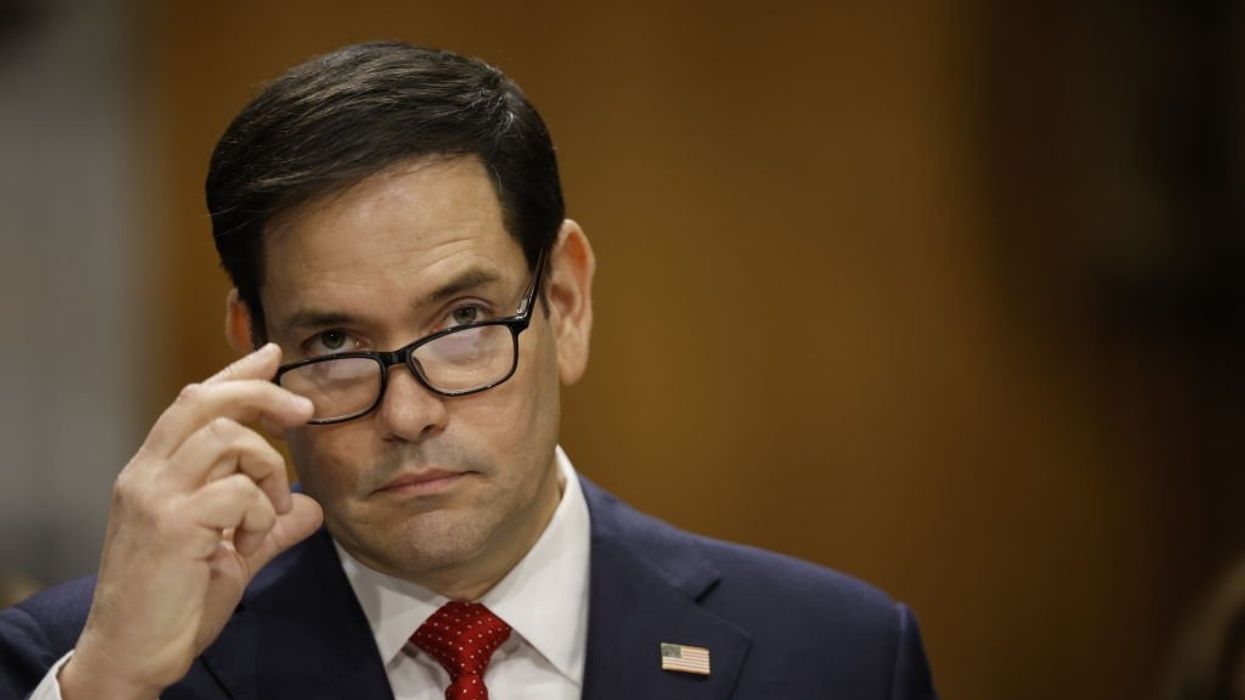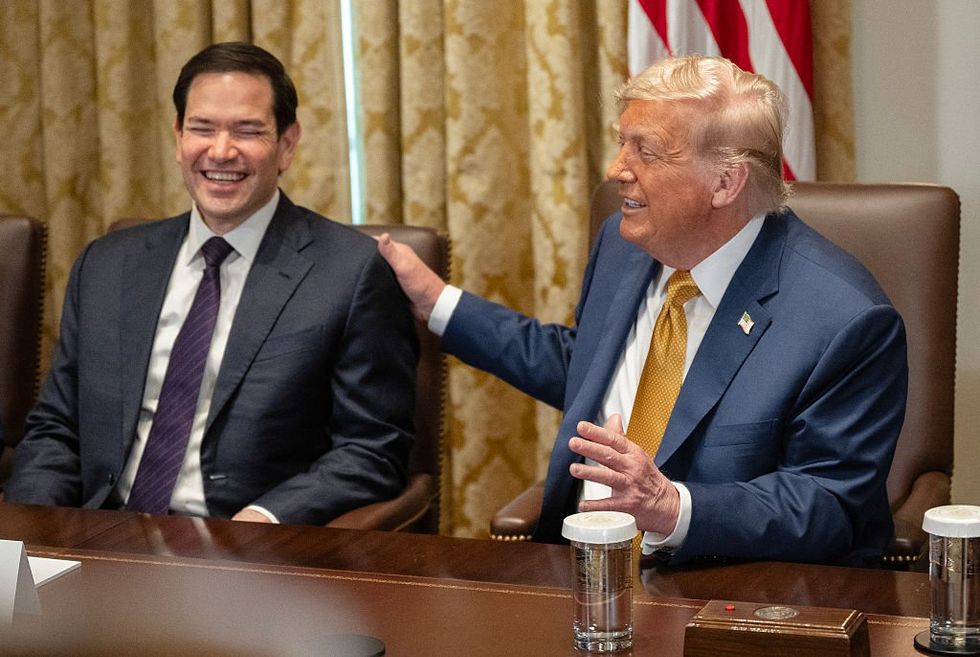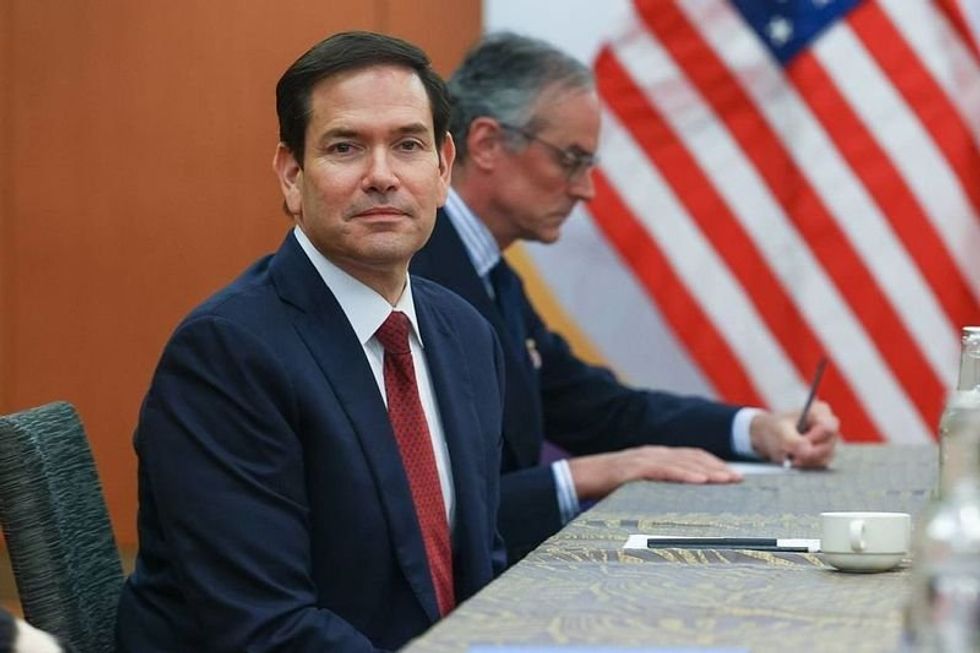
Photo by Kevin Dietsch/Getty Images

Foreign nationals who overstay their visas risk forfeiting a bond of up to $15,000 and other consequences.
President Donald Trump issued an executive order on his first day in office titled "Protecting the American People Against Invasion."
In addition to directing all executive departments and agencies to "employ all lawful means to ensure the faithful execution of the immigration laws of the United States against all inadmissible and removable aliens," the president tasked the secretaries of treasury, state, and homeland security to establish a visa bond program.
Pursuant to Trump's executive order, the State Department published a temporary final rule in the Federal Register on Tuesday announcing the commencement of a 12-month visa bond pilot program aimed at ensuring that foreign nationals pay a hefty price if they overstay their welcome.
Secretary of State Marco Rubio notified State Department employees of the program in a cable on Monday.
A State Department spokesperson told Blaze News, "The pilot reinforces the Trump administration’s commitment to enforcing U.S. immigration laws and safeguarding U.S. national security.
Under the program, consular officers can require aliens applying for visas as temporary visitors for business or pleasure to post bonds of up to $15,000 if they hail from countries identified by the State Department as having high visa overstay rates, substandard screening and vetting information, or offering citizenship by investment.
According to the State Department spokesperson, foreign policy considerations may also be factored into whether a bond is required.
By overstaying a visa, an alien could forfeit the bond as well as risk the usual consequences: a three-year, a 10-year, or an indefinite ban from the country, depending on the duration of unlawful presence.
The pilot program — established under the Immigration and Nationality Act, which authorizes consular officers to require aliens to post a bond for a B-1/B-2 visitor/tourist visa — is effective from Aug. 20, 2025, until Aug. 5, 2026.
'With their own money on the line, more temporary visa holders will comply with their required departure date.'
"In line with an America First foreign policy, fully enforcing U.S. immigration laws bolsters American security, promotes lawful travel, and ensures foreign visitors depart the United States on time and in accordance with the terms of their visas," said the spokesperson.

Lora Ries, director of the Heritage Foundation's Border Security and Immigration Center, told Blaze News, "Large numbers of visa-overstayers have been a problem in our country for decades. The U.S. government should use various tools to end this abuse of our legal visa system."
"President Trump has issued visa restrictions for a few countries with high overstay rates. Applying visa sanctions is another tool that the State Department can use against countries with high overstay rates," continued Ries. "Requiring travelers to post a bond is a more direct solution tied to the individual rather than a country, since it is the individual deciding to ignore our law to depart the U.S. on time. With their own money on the line, more temporary visa holders will comply with their required departure date, so it would be an effective tool in that regard."
Simon Hankinson, a senior research fellow at the Border Security and Immigration Center who worked for the State Department for over two decades, told Blaze News that the program is "great," though he does not want it exploited to grant questionable applicants a visa.
"Consular officers should refuse any applicant who does not qualify for a visa," continued Hankinson. "In most cases, that means they fail to convince the officer that they have a home outside the U.S. that they intend to return to and that they will do what they say in the U.S. and nothing more."
While the State Department would not immediately disclose which countries may be affected, past visa overstay data indicates which countries would be prime candidates.
RELATED: State Department finally gets to trim the bureaucratic fat — and Rubio's going the distance

According to a 2024 U.S. Customs and Border Protection "Entry/Exit Overstay Report," there were over 314,000 overstays by business or pleasure visitors from non-Visa Waiver Program countries in fiscal year 2023, not including the 79,443 overstays by nonimmigrant visitors from Canada and Mexico.
There were an additional 99,460 overstays by business or pleasure visitors from VWP countries.
Among the worst offenders for B1/B2 visa overstays among non-VWP countries in terms of total overstays were Brazil, China, Colombia, Dominican Republic, Ecuador, Haiti, Honduras, India, Jamaica, and Venezuela.
When asked which countries should be at the top of the list, Hankinson said that countries with high rates of fraud in applications or of overstay/abuse rates might be a place to start but that he saw "no reason the bonds could not eventually cover every country, for at least high-risk visa categories."
'The left, libertarians, and anyone with a business interest in open borders want no limits.'
"The bond should be much higher than the typical price for that category and country for an alien smuggler to bring someone in illegally, or else it won’t work as a deterrent," added Hankinson.
Alex Nowrasteh, vice president for economic and social policy studies at the Cato Institute, complained in a statement obtained by CBS News that the program "will convince most foreigners not to bother coming."
"The result will be a decimated tourist industry. Tourists spend over $200 billion annually in the U.S., spending that counts as exports," continued Nowrasteh. "The administration's proposal will not only undermine much of the tourist industry, but it will counteract the administration's goals to reduce the trade deficit."
A spokesperson for the U.S. Travel Association similarly whined about the program, noting, "If this is implemented, the U.S. will have one of, if not the highest, visitor visa fees in the world."
Neither Hankinson nor Ries is buying the line sold by such critics.
"The left, libertarians, and anyone with a business interest in open borders want no limits. Americans reject this as selfish and self-destructive," said Hankinson, adding that if properly applied, the visa bonds will minimally impact tourism and the countries from which most tourists hail.
Ries suggested that "instead of just complaining about the government trying to end a long and serious violation of our law, cities and companies that rely on tourism should encourage visitors to comply with our laws and depart when required."
"That simple addition would help to end the visa overstay issue," added Ries.
Like Blaze News? Bypass the censors, sign up for our newsletters, and get stories like this direct to your inbox. Sign up here!